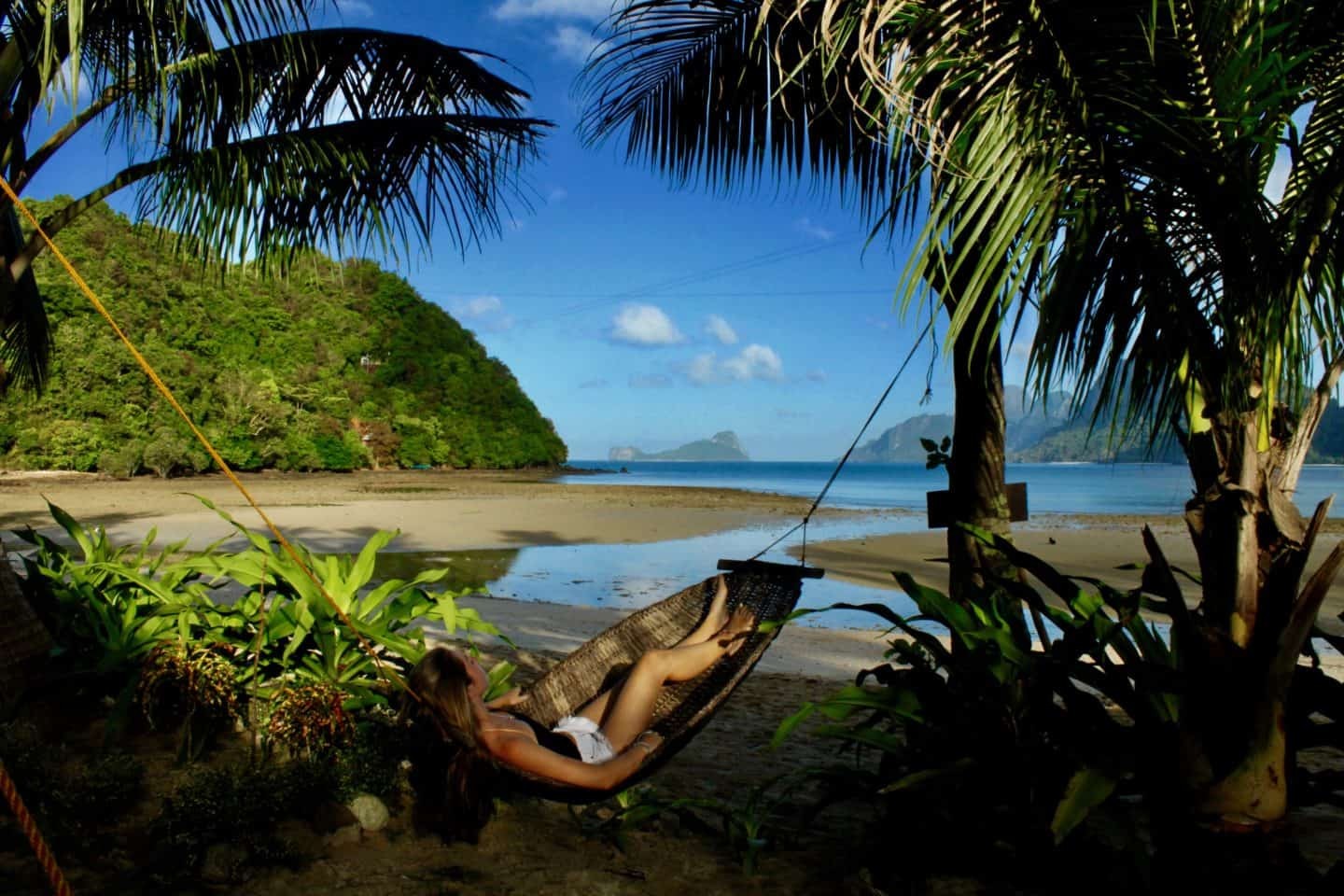The Philippines, an archipelago of over 7,000 islands, boasts stunning beaches, vibrant culture, and warm hospitality. This makes it a prime destination for tourists and a fantastic place to start a career as a tour guide. If you’re passionate about sharing the beauty and history of the Philippines, here’s how to become a tour guide in the Philippines.
Understanding the Philippines Tourism Landscape
Before diving into the specifics, it’s important to grasp the basics of the tourism industry in the Philippines. The country welcomes millions of tourists annually, with popular destinations including Boracay, Palawan, Cebu, and Manila. Each region offers unique experiences, from pristine beaches and diving spots to historical landmarks and bustling city life. This diverse landscape creates opportunities for specialized tour guides.
Alt text: Tourists enjoying the sunset at Las Cabanas Beach in El Nido, Palawan, Philippines, a popular destination for guided tours.
Steps to Becoming a Tour Guide in the Philippines
-
Assess Your Skills and Interests:
- Passion for the Philippines: A genuine love for the country’s culture, history, and natural beauty is essential.
- Communication Skills: Excellent verbal communication and storytelling abilities are crucial. You need to engage your audience and convey information clearly and engagingly.
- Interpersonal Skills: Being friendly, approachable, and patient are key to dealing with diverse groups of people.
- Knowledge Base: A solid understanding of Philippine history, geography, culture, and current events is necessary.
- Language Proficiency: Fluency in English is a must, as it’s widely used in the tourism industry. Knowledge of other languages, such as Mandarin, Korean, or Japanese, can be a significant advantage.
- Problem-Solving Skills: The ability to handle unexpected situations, such as itinerary changes or emergencies, is vital.
-
Gain Relevant Education and Training:
-
Formal Education: While not always mandatory, a bachelor’s degree in tourism, history, or a related field can provide a strong foundation.
-
Tour Guiding Courses: Look for accredited tour guiding courses offered by reputable institutions. These courses typically cover topics such as:
- Philippine history and culture
- Tour guiding techniques
- Customer service
- First aid and emergency response
- Environmental awareness and sustainable tourism
-
TESDA (Technical Education and Skills Development Authority) Certification: TESDA offers certifications for tour guiding, which are highly regarded in the industry. Completing a TESDA-accredited program can significantly enhance your credibility.
-
-
Obtain Necessary Licenses and Permits:
-
Department of Tourism (DOT) Accreditation: The DOT is the primary regulatory body for the tourism industry in the Philippines. To operate as a licensed tour guide, you’ll typically need to obtain accreditation from the DOT. Requirements may include:
- Proof of completion of a DOT-accredited tour guiding course
- Passing a DOT examination
- Submission of required documents (e.g., resume, NBI clearance, medical certificate)
-
Local Government Permits: Depending on the area where you plan to operate, you may also need to secure permits from local government units (LGUs).
-
-
Specialize in a Niche (Optional):
- Historical Tours: Focus on historical sites and events, such as Intramuros in Manila or the Battle of Bataan.
- Eco-Tours: Lead tours that emphasize environmental conservation and sustainable tourism practices in destinations like Palawan or Bohol.
- Adventure Tours: Guide activities such as hiking, diving, or rock climbing in areas like Sagada or El Nido.
- Food Tours: Showcase the diverse culinary scene of the Philippines, from street food to fine dining.
-
Gain Practical Experience:
- Volunteer or Intern: Offer your services as a volunteer or intern with established tour operators or tourism organizations. This provides valuable hands-on experience and networking opportunities.
- Shadow Experienced Guides: Observe and learn from seasoned tour guides. Pay attention to their techniques, how they handle questions, and how they manage groups.
- Practice Your Skills: Conduct mock tours for friends and family to refine your presentation and storytelling abilities.
Alt text: A tour guide showing El Nido, Palawan, to a group of tourists in the Philippines.
Essential Skills and Qualities of a Successful Tour Guide
- Deep Knowledge of the Philippines: Stay updated on current events, tourism trends, and new attractions. Continuously expand your knowledge base through reading, research, and travel.
- Exceptional Communication Skills: Be clear, concise, and engaging in your delivery. Adapt your communication style to suit different audiences.
- Strong Interpersonal Skills: Build rapport with your tour participants. Be attentive to their needs and concerns.
- Organizational Skills: Manage time effectively, handle logistics, and ensure smooth tour operations.
- Problem-Solving Abilities: Be prepared to handle unexpected situations, such as itinerary changes, transportation issues, or medical emergencies.
- First Aid and Emergency Response Skills: Obtain certification in first aid and CPR. Know how to respond to common medical emergencies.
- Enthusiasm and Passion: Your enthusiasm for the Philippines and your subject matter will be contagious and enhance the tour experience for your participants.
- Professionalism: Maintain a professional demeanor at all times. Be punctual, reliable, and respectful.
- Cultural Sensitivity: Be mindful of local customs and traditions. Treat all cultures with respect and understanding.
Building Your Career as a Tour Guide
- Network: Attend industry events, join tourism associations, and connect with other tour guides, tour operators, and tourism professionals.
- Market Yourself: Create a professional website or social media profile to showcase your skills and services.
- Collect Feedback: Ask for feedback from your tour participants to identify areas for improvement.
- Stay Updated: Continuously learn about new developments in the tourism industry, emerging destinations, and changes in regulations.
Alt text: Tourists enjoying a guided tour of Kawasan Falls in Cebu, Philippines, highlighting the natural beauty accessible through tour guiding.
Embracing Sustainable Tourism
As a tour guide, you have a responsibility to promote sustainable tourism practices. This includes:
- Educating Tourists: Inform your tour participants about the importance of responsible travel and environmental conservation.
- Supporting Local Businesses: Encourage tourists to patronize local restaurants, shops, and accommodations.
- Minimizing Environmental Impact: Avoid activities that harm the environment, such as littering or disturbing wildlife.
- Respecting Local Culture: Encourage tourists to be respectful of local customs and traditions.
Conclusion
Becoming a tour guide in the Philippines can be a rewarding career for those who are passionate about sharing the country’s beauty and culture. By gaining the necessary education, obtaining the required licenses, developing essential skills, and embracing sustainable tourism practices, you can embark on a fulfilling journey of guiding visitors through the wonders of the Philippines. With its rich history, stunning landscapes, and warm hospitality, the Philippines offers endless opportunities for tour guides to create memorable experiences for travelers from around the world.

